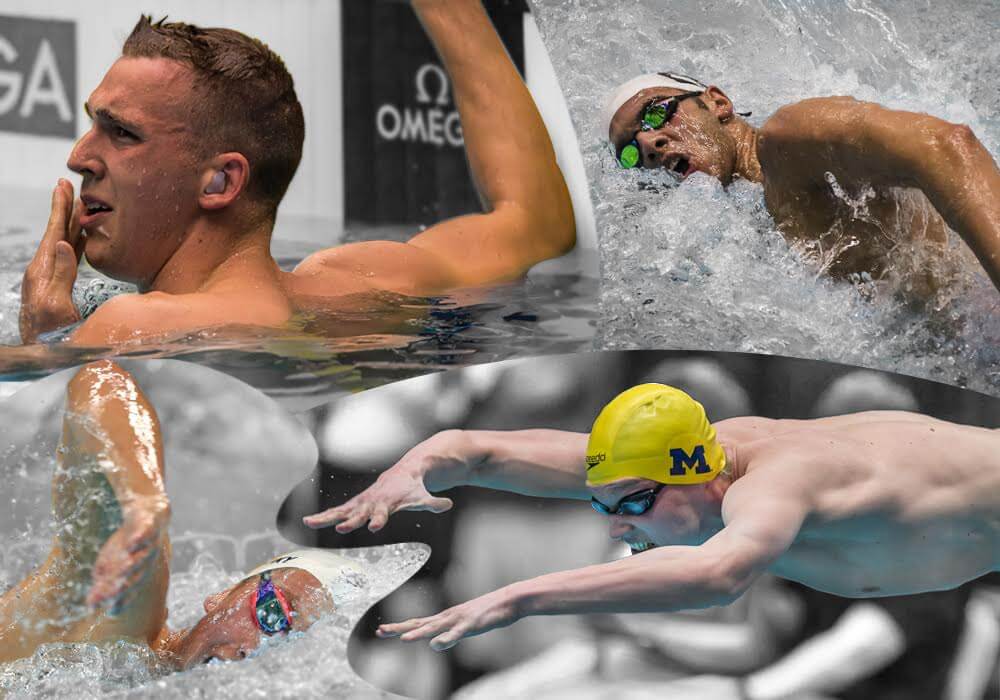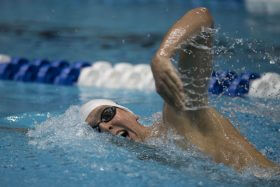Morning Splash: Revisiting the Most Exciting NCAA Distance Race Ever

Long before four men touched the wall with the four fastest times in history, all of those watching the 1650 free at the men’s NCAA championships realized that they were being treated to an epic.
In lane one was Michigan’s PJ Ransford, the Michigan junior who put the pedal down on the second 500. As Ransford opened up a five-yard lead, Michigan’s Felix Auboeck, Texas’ Clark Smith and Northwestern’s Jordan Wilimovsky were battling for position in the middle of the pool.
But after the 1000, Ransford faded, and out in lane eight, South Carolina’s Akram Mahmoud had surged. Mahmoud was desperate for redemption after a narrow defeat in the event in 2016, and by the 1300 he found himself head-to-head with Auboeck, Smith and Wilimovsky.
After a furious, intense final stretch, it was Smith who pulled away on the last 50 to get his hand on the wall first in 14:22.41. The time was more than a second under the American and U.S. Open record of 14:23.52. Auboeck finished second (14:22.88), followed by Mahmoud (14:22.99) and Wilimovsky (14:23.45).
After the meet, we collected impressions from five interested observers and will share those thoughts below. Those referenced include:
- Sam Kendricks, meet announcer
- Austin Surhoff, former University of Texas All-American and NCAA champion
- McGee Moody, University of South Carolina head coach
- Cathleen Pruden, Swimming World High School Content Manager
- Connor Jaeger, 2016 Olympic silver medalist in 1500 free and former American record-holder in 1650 free
All watching the race that night in Indianapolis except for Jaeger, who was back home in New Jersey. But despite the distance, it didn’t take him long to find out his American record had gone down.
“I looked at my phone and had a bunch of texts like, ‘Oh my god!’” Jaeger said. “Texts of different points in the each, who was winning at what time. It sounded really exciting. I do plan on watching it on YouTube, but I looked at all the splits, and it definitely looked like an exciting race.”
Read below for a collection of their thoughts from throughout the race.
Kendricks on the lead-up to the race:
“I don’t like to do predictions, but this race was sitting in my head since a week after it finished last year. All I was thinking was, ‘How will this affect Akram Mahmoud, and what will be his resiliency level, and what will it mean for him training-wise?’”
Pruden pre-race:
“Going into the mile I knew it was a hyped up race. While I recognized that it had potential, it seemed like media, fans, etc. were setting their standards a little too high. Despite being a distance swimmer myself, it was, after all, the mile. I know that it’s usually not as exciting as so many other events.”
Kendricks on Ransford:
“When I saw Ransford go, I thought, ‘This is the guy in the pack that’s going to try and break everybody.’ But in looking at the race again, I thought he went too early. Too hard, too early in the middle. I think he would have been right there if he had just gone with the pack, stayed with the pack and try to race them. His rabbit approach in the middle third set the race up for the finish because it forced those other guys to stay at a pretty high intensity.”
Surhoff on Smith:
Photo Courtesy: Peter H. Bick
“There’s such a mystique around Clark. Every race you wonder what the ceiling is and what the limit is… I couldn’t help but have the feeling that once Clark got past the 700 or so and was still in the race that there was no chance he was going to lose. That’s the honest-to-God truth—I did not think it was possible for him to lose that race.
“Watching him over the years, if he’s in the race, there’s no one in the sport that has the capacity to finish like he does. I watched it his sophomore year in Iowa when he won the 500 free and just took everyone down the last 100. The races that he wins and that he succeeds in, he just has to be in the race. Nobody else can finish like he does on the last 500.”
Moody on Mahmoud:
“We did our best to have Akram put last year’s race out of his mind. We worked really hard to design a race plan that was going to keep that from happening this year. It basically came down to him running out of gas last year.
“The plan this year was to take the first 500 out in about 4:22. Wanted to be about 4:22-4:23 on the second 500. As we’re watching that first 500 unfold, and he came into wall in about 4:23, we knew that he was on his race plan. He was where he needed to be.”
Pruden on Mahmoud:
“I knew Mahmoud had done well last year, but he seemed so out of it. I knew he relied on a really quick latter half, but the gap still seemed like far too much.
“I don’t really know how it happened but suddenly Mahmoud was very in the race, swimming from the outside. It was a five-man race that fell off to a four-man race and for that last 200 or so it seemed like every 50 had to be the last.”
Kendricks on finish:
“We get into that last 50, and I’m like, ‘This is Clark’s race. He’s going to kill those guys. It’s not even going to be close. He’s going to win by a bodylength and a half.’ That’s what I felt like was going to happen.
“Then with 25 to go, I see Auboeck winding up and closing on Clark… And then I see Mahmoud—maybe he’s going to do it. And the whole time that last 25, I’m thinking, ‘It’s gotta be Mahmoud. The story has got to be Mahmoud.’ I honestly think, had Auboeck wound it up 10 to 25 yards earlier, he runs down Clark because it seemed like the last five strokes, [Smith] didn’t have a lot left in the tank.
Surhoff on seeing an injured Smith helped off the deck:
“That’s a tough as hell swim. In retrospect, after finding out about the injury and how much it affected him during the race. That’s one of the tougher, more gritty performances I’ve seen when you consider that he set a record as well.”
Jaeger on the record:
“In one race, I had a quick drop from fastest of all-time to now fifth.”
Moody on Mahmoud’s post-race emotions:
“It’s one of those things where you can be upset that he didn’t win—because you know he wanted it really badly—but what do you tell a young man that just put up the third-fastest time in history but then also had the third-fastest time in the heat. We just told him how proud we were of him. The biggest thing is he raced with heart. He battled through that last 300 to 400 yards.”
Pruden’s final impression:
“It’s cool to think that Katie Ledecky does that by herself all the time—sets a world record. This was in some ways equally impressive because all four of these guys demolished history, but they relied on each other and raced one another to get there. If you put walls in between their lanes and they were swimming alone, what would have been the result? I don’t know, but I really think those times were the result of it being a race, not just four very talented swimmers.”
Jaeger from the distance swimmer’s perspective.:
“A lot of people were saying they thought the mile was the best race of the meet, and I have a lot of pride for that, just being a miler. I’m biased—I would say it was the most awesome race of the meet with how much back-and-forth there was going on—but to hear other people say it and to hear other non-distance people say it is awesome.”
“Congrats to all of them. Great representation of distance racing in general.”
Kendricks—“the greatest race I’ve ever witnessed:”
“I wasn’t talking about the greatest race ever. I was talking about the greatest race I’ve ever seen in person. Would I put it ahead of the [U.S. 400 free] relay victory [from 2008] and the [Jason] Lezak close? I wouldn’t do that. But in terms of what it was, what we all saw and what I just witnessed with my own two eyes in front of me, I think I’ll be hard-pressed in my career to ever call a race that has that kind of drama.”
Moody on historical implications:
“To see all four of those guys go under the American record, in my opinion, that’s the greatest race in NCAA history. Definitely the greatest mile, but to have those guys over that length of time to battle in an event that’s so mentally challenging, so physically challenging, and then the four of them go the four fastest times ever in the event, that was awesome. That was fun. All the guys in that heat deserved a pat on the back because it was incredible.”





What about the men’s 1500 final at Montreal 1976?
Colorado’s Clark Smith!
????
Very nicely presented impressions of a great race. The last comment by Pruden was especially interesting. I know Ledecky broke or re-broke individual American records 5 times and indiv NCAA records 8 times this NCAA season in multiple distance events, a feat which has in itself been somewhat overlooked or perhaps just taken for granted because well, she’s Katie. But what I had really not thought about until Pruden’s comment is how hard that must be with no one swimming right at your hip, to say, take down the 1650 Free Am record by ten secs like Ledecky did mid-season at an invitational with no one beside you. This renaissance of distance swimming is fantastic!!!